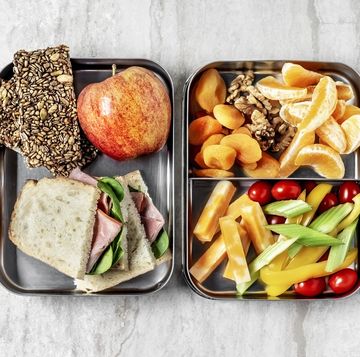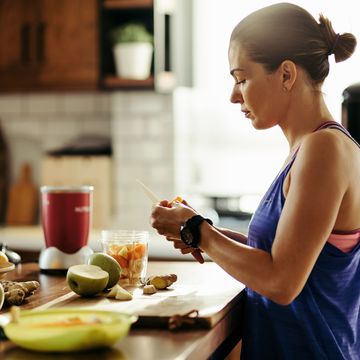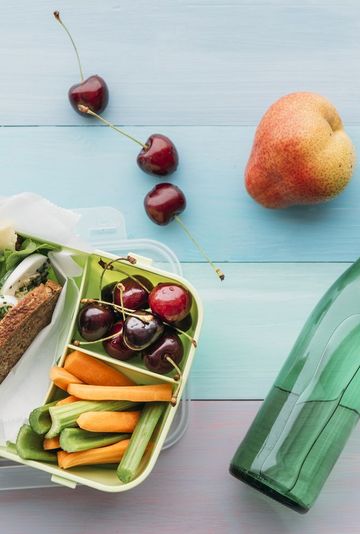It's not just what you eat, but how, why and when that can be vital when it comes to weight control. Read on to discover the eating habits that could be sabotaging your dieting efforts.
1. Depriving yourself of foods you love
'The sheer language of restrictive eating that surrounds most diets increases how much you want to eat the foods you're denied. So it actually has the opposite psychological effect that you want it to,' says Aisling Pigott, dietitian and spokesperson for the British Dietetic Association (BDA).
The silent mantra, 'I will not eat chocolate, I will not eat chocolate,' for instance, will eventually make you go nuts and commit waistline suicide. Whereas if you tell yourself you're going to enjoy a little chocolate once a week, you can go right ahead, knowing everything is OK in moderation.
'Set rules around how often you'll eat the foods you miss – say, once a week. Then phrase your thinking in positive terms – that is, "I'm going to enjoy a little chocolate once a week". The key is to remove this idea of "good food vs bad food", which ultimately makes you obsess about the so-called bad ones," advises Piggott.
Studies show that people who deprive themselves of foods they really love often overeat the things they don't enjoy so much, in order to compensate, she adds.
2. Not including exercise in your weight loss plan
Google 'weight loss vs exercise' and you'll find no shortage of arguments claiming that you can get trim without exercising if you really go hell for leather on dieting. But exercise burns calories, at the same time as raising your metabolic rate, regulating your appetite and changing your body shape, meaning that it will aid your overall plan significantly – with the added bonus that you'll feel fitter and healthier.
Exercise is also known to improve mood – also helpful for maintaining a positive attitude towards reaching your goal of a healthy weight.
'Don't get into using exercise to balance out calories, though,' warns Pigott. 'That's where people often go horribly wrong. It's much better to think of exercise as a benefit to your overall good health.'
3. Relying on short-term calorie reduction
This is no way to fight the flab – and it's all down to evolution. Avoiding starvation was a key evolutionary factor for early homo sapiens, so if we suddenly reduce our calorie intake, our bodies and brains are programmed to fight back.
'Our bodies think "Help! Famine!" and hang onto fat storage like mad – not exactly conducive to reducing our waistlines.' explains Dr Marilyn Glenville, nutritionist and author of Fat Around the Middle and Natural Alternatives to Sugar. 'It's important to remember that many generations ago, our whole life was dependent on us surviving and that's what our bodies are geared up for.'
It's not as if weight loss from sudden calorie reduction lasts, points out Pigott. 'You get dramatic weight loss in the first few days – but it's mostly fluid, so it's not sustainable, so it leads to people feeling disheartened that the three to four pounds a day they were losing at first isn't continuing.
'Far better to make small and maintainable changes to your eating habits that you can stick to in the long run.'
In fact, because your body craves those calories it's missing, you'll feel hungry most of the time – which could make you eat even more. Our blood sugar levels drop too – which is why we get sugar cravings – again making us likely to eat more, not less. 'Rapid weight loss can have nasty side effects too, leading to gall stones and nutritional deficiencies,' adds Pigott.
4. Fearing carbs
'Carbs' has become a dirty word, particularly since the popularity of diets including the Atkins, Dukan and South Beach. But carbohydrates are important to your health as the body's main source of energy. Moreover, healthy sources of carbs - such as starchy foods, vegetables, fruits and dairy - are important sources of nutrients including calcium, iron and B vitamins.
What's more, cutting out carbs and replacing them with fats and protein could increase your intake of saturated fat, which won't just make you more prone to put on weight, but can also raise your cholesterol levels and put you at risk of heart disease.
'Not all carbohydrates are equal – it's the type and amount we include in our diet that matters,' explains Glenville. 'By all means, cut down refined carbohydrates – that is, sugary foods –and include healthier, unrefined ones instead, such as brown rice, oats and vegetables.'
Pigott adds that carbs help stabilise our blood glucose, which allows us to make rational decisions about food choices. 'We know that without carbs, people are prone to make quick decisions around food that allow them to overeat. So you might skip carbs at dinner, but then your blood glucose drops and you go for the nearest foods you can at 10pm,' she says.
5. Skipping breakfast
One of the biggest challenges people struggle with when they're trying to lose weight is the belief that they have to cut down the amount of food they eat – and research shows the meal they're most likely to skimp on, or even cut out, is breakfast. But, agree all food experts, breakfast is the most important meal of the day and should account for around 20 per cent of your total calorie intake.
If you skip it, it may send messages to your brain that your body is going into hibernation mode and any calories you consumer later are more likely to be stored as fat. Numerous studies show that people who try to lose weight tend to be far more successful if they regularly eat breakfast.
Foods to fill up on first thing are high-fibre fodder such as nuts, fruit, and wholegrain, as well as natural low-fat yoghurt and low-calorie fruit juices.
'Always check before assuming breakfast foods are high calorie,' adds dietitian Azmina Govindji. 'An egg, for example, has just 85 calories, whilst two weetabix and semi-skimmed milk has around 200 calories.'
6. Feeling you have to follow a certain diet
There are zillions of diets – low carb or no carb, high or low fat, protein rich or poor – and they all claim they're proven to work. 'Of course, anything that restricts your food intake will result in weight loss, but unless you want to follow a restricted diet for the rest of your life – which we know from research that only a small proportion of people can manage – then no diet really supersedes the other in terms of what it will achieve,' says Pigott.
Save your time and money, she advises, and do your research on reliable dietary information from sources like NHS Choices and the BDA to work out a plan to suit you.
'You don't need a PhD to design your own diet. Nor do you need exotic ingredients like acacia berries. You just do some basic research and to set some boundaries to suit the way you eat. It's no coincidence that people who have dieted their whole lives have had so many conflicting views that they often have no idea of what a normal, healthy diet looks like anymore. It's time we listened to our own bodies.'
7. Yo-yo dieting
'A lot of diets don't even have a scientific basis, yet they blind you with pseudoscience that makes you think, "Oh that must be true!"' says Pigott.
'A common claim is that their diet increases metabolism. But when you look at the science, it's minimal and doesn't really work, leading the dieter to give up on it and try another one instead. Others might come back to the same diet time and time again, each time failing because it was never sustainable in the first place.'
Before you know it, she says, you're a perpetual dieter. 'Not only does this lead to a poor relationship with food, but it can disinhibit your body's natural ability to know if it's hungry or full, which is no good at all for sustained weight loss. Then there's the effect on your muscles, which are constantly being starved and therefore become weaker and weaker, ultimately leading to reduction in metabolism and making your body less efficient at losing weight than ever.'
Written by Kate Hilpern
More on prima.co.uk: Pick the best diet plan for your lifestyle














